Venir Conjugation in All 8 Tenses
Venir in French is one of the most frequently used verbs. The meaning of venir is “to come” or “to come from (in the case of a place)”.
This article gives you venir conjugations in the most common indicative tenses of the French language, as well as some hints on how you would use them in everyday speech. This article will also help you to learn correct grammar so your speech and communication skills in French become top notch!
Why only the 8 indicative tenses? Because those are the tenses you’ll hear when practicing your French! There are 13 other tenses but they have more to do with mood and intent. On top of that they’re rarely used, so even if you’re an intermediate or advanced French learner then the indicative 8 are ALL you need!
Before you continue: Corrector provides a free tool to help you correct grammar and spelling in any language (including conjugations)! Just click here to access it!
French Tenses for Venir Conjugation
- Présent. Something that is happening now. This can either be ongoing or instant. Eg: I come. / I’m coming.
- Imparfait (imperfect). Used to describe ongoing, continual or habitual past events. Eg: I was coming.
- Passé simple is not common and normally found in formal or literary contexts. If you’re a beginner or even intermediate French learner then you can safely ignore it for now (but it’s still included below for convenience). Eg: I came
- Passé composé. Widely used to talk about completed past actions. Eg: I came.
- Futur simple (simple future) is used when you intend to describe a general future state of being. Eg: I will come. Once again, beginners can generally ignore this conjugation as there’s a much simpler version (next in list) that will suffice for now.
- Futur proche (near future) describes an upcoming action. In English this would be “I am going to come …“. This should be your go to future tense when learning conjugations.
- Plus-que-parfait (pluperfect). This tense indicates that an action had taken place and was completed before another past action took place. Eg: I came before eating my meal.
- Passé antérieur is not common at all (just like passé simple), and again is found in formal or literary contexts. Eg: I had come.
- Futur antérieur (future perfect) is used to describe a future action that will be completed in the future before another action is started. For example: I will have come before eating breakfast.
Mastering venir conjugation in at least 3 tenses (present, passé composé and futur proche is essential for becoming proficient in French. In fact I would concentrate on these 3 and only study the others when they come up in literature or other contexts.
The following tables also give usage examples of venir used in its respective tense.
Venir Présent Conjugation (Present)
Présent definition: The Présent tense is used to describe actions or states that are happening at the current moment or are generally true. It is the most frequently used tense in all languages. Note that French doesn’t have the present continuous verb tense like in English. Hence, “I come” and “I am coming” both translate to je viens.
| Pronoun | Conjugation | English Translation |
|---|---|---|
| Je | viens | I come |
| Tu | viens | You come |
| Il/Elle | vient | He/She comes |
| Nous | venons | We come |
| Vous | venez | You come |
| Ils/Elles | viennent | They come |
Example sentences:
- Je viens de Paris. (I come from Paris.)
- Tu viens toujours en retard. (You always come late.)
- Elle vient au cinéma avec nous. (She’s coming to the movies with us.)
Venir Imparfait Conjugation (Imperfect)
Imparfait definition: The Imparfait tense is used to describe ongoing or habitual actions from the past. It is commonly used to set the background for other actions in the past. In everyday French it is used to talk about past events or actions that were ongoing. Imparfait is also used to talk about feelings, attitudes, time & date and the weather. In English you may hear this said as “used to”. Eg: I used to come
| Pronoun | Conjugation | English Translation |
|---|---|---|
| Je | venais | I used to come |
| Tu | venais | You used to come |
| Il/Elle | venait | He/She used to come |
| Nous | venions | We used to come |
| Vous | veniez | You used to come |
| Ils/Elles | venaient | They used to come |
Example sentences:
- Je venais te voir tous les jours. (I used to come see you every day.)
- Tu venais toujours avec ton frère. (You used to come always with your brother.)
- Nous venions en train. (We used to come by train.)
Venir Passé Simple Conjugation (Simple Past)
Passé Simple definition: The Passé Simple manger conjugation is primarily used in written literature, especially within narrative texts such as novels, stories, and historical accounts. In everyday spoken language, the Passé Simple is rarely used but you will see it everywhere in the aforementioned literary works. In meaning there is virtually no difference between this tense and the Passé Composé. Eg: I came.
| Pronoun | Conjugation | English Translation |
|---|---|---|
| Je | vins | I came |
| Tu | vins | You came |
| Il/Elle | vint | He/She came |
| Nous | vînmes | We came |
| Vous | vîntes | You came |
| Ils/Elles | vinrent | They came |
Example sentences:
- Je vins dès que j’entendis l’annonce. (I came as soon as I heard the announcement.)
- Vous vîntes à la fête hier soir. (You came to the party last night.)
- Ils vinrent nous aider à déménager. (They came to help us move.)
Venir Passé Composé Conjugation (Present Perfect)
Passé Composé definition: The Passé Composé tense is used to talk about completed actions in the past. It is one of the most common past tenses and is frequently used in everyday French language. The key fact you need when deciding to use this tense is to ask if the past action have a start and finish in the past. If yes, then Passé Composé is the tense you need! The literal translation is “I have come” but in English we normally shorten this to “I came“.
| Pronoun | Conjugation | English Translation |
|---|---|---|
| J’ai | venu | I have come |
| Tu as | venu | You have come |
| Il/Elle a | venu | He/She has come |
| Nous avons | venu | We have come |
| Vous avez | venu | You have come |
| Ils/Elles ont | venu | They have come |
Example sentences:
- J’ai venu te rendre visite hier. (I came to visit you yesterday.)
- Tu es venu à la réunion ce matin. (You came to the meeting this morning.)
- Nous sommes venus en avance pour éviter le trafic. (We came early to avoid traffic.)
Venir Futur Simple Conjugation (Simple Future)
Futur simple definition: The futur simple is used to express an action that will happen in the future. It is commonly used in everyday language when talking about general future plans or intentions. If you find this tense complicated then you can always just use the “aller” form in the next section “futur proche”.
| Pronoun | Conjugation | English Translation |
|---|---|---|
| Je | viendrai | I will come |
| Tu | viendras | You will come |
| Il/Elle | viendra | He/She will come |
| Nous | viendrons | We will come |
| Vous | viendrez | You will come |
| Ils/Elles | viendront | They will come |
Example sentences:
- Je viendrai te chercher demain. (I will come to pick you up tomorrow.)
- Est-ce que tu viendras à la fête samedi ? (Will you come to the party on Saturday?)
- Ils viendront nous rendre visite pendant les vacances. (They will come to visit us during the holidays.)
Venir Futur Proche Conjugation (Near Future)
Futur Proche definition: This is known as the “going to [come]” future tense. It is used to express actions that are planned or about to happen in the near future. It is very commonly used in everyday spoken French. Technically it is not an official tense but is often listed as one.
| Pronoun | Conjugation | English Translation |
|---|---|---|
| Je | vais venir | I am going to come |
| Tu | vas venir | You are going to come |
| Il/Elle | va venir | He/She is going to come |
| Nous | allons venir | We are going to come |
| Vous | allez venir | You are going to come |
| Ils/Elles | vont venir | They are going to come |
Example sentences:
- Je vais venir te voir tout de suite. (I am going to come see you right away.)
- Est-ce que tu vas venir à la réunion demain ? (Are you going to come to the meeting tomorrow?)
- Nous allons venir t’aider avec tes devoirs. (We are going to come help you with your homework.)
Venir Plus-que-parfait Conjugation (Pluperfect)
Plus-que-parfait definition: Expresses an action that had happened before some other past action took place. It is commonly used in written language, especially in literature and formal texts.
| Pronoun | Conjugation | English Translation |
|---|---|---|
| J’avais | venu | I had come |
| Tu avais | venu | You had come |
| Il/Elle avait | venu | He/She had come |
| Nous avions | venu | We had come |
| Vous aviez | venu | You had come |
| Ils/Elles avaient | venu | They had come |
Example sentences:
- J’avais déjà venu ici auparavant. (I had already come here before.)
- Tu avais venu me voir quand j’étais malade. (You had come to see me when I was sick.)
- Ils avaient venu nous rendre visite l’année dernière. (They had come to visit us last year.)
Venir Passé Antérieur Conjugation (Past Anterior)
Passé Antérieur definition: This tense is a literary tense used in formal and historical writing. It is similar in meaning to the Plus-que-parfait tense (Pluperfect) but is considered more archaic and is mostly found in classical literature. As a French speaker you will hardly ever (if at all) use this tense!
| Pronoun | Conjugation | English Translation |
|---|---|---|
| J’eus | venu | I had come |
| Tu eus | venu | You had come |
| Il/Elle eut | venu | He/She had come |
| Nous eûmes | venu | We had come |
| Vous eûtes | venu | You had come |
| Ils/Elles eurent | venu | They had come |
Example sentences:
- J’eus venu dès que j’ai entendu la nouvelle. (I had come as soon as I heard the news.)
- Vous eûtes venu nous aider si vous aviez su. (You would have come to help us if you had known.)
- Elle eut venu avant que la fête ne se termine. (She had come before the party ended.)
Venir Futur Antérieur Conjugation (Future Perfect)
Futur Antérieur definition: This tense is used to express actions that will have been completed before a specific future point in time. In fact that preceding sentence is an exact example of it, using the phrase “will have been”. It is used both in written and spoken language.
| Pronoun | Conjugation | English Translation |
|---|---|---|
| J’aurai | venu | I will have come |
| Tu auras | venu | You will have come |
| Il/Elle aura | venu | He/She will have come |
| Nous aurons | venu | We will have come |
| Vous aurez | venu | You will have come |
| Ils/Elles auront | venu | They will have come |
Example sentences:
- J’aurai venu dès que tu m’auras appelé. (I will have come as soon as you call me.)
- Tu auras venu chercher ton colis demain matin. (You will have come to pick up your package tomorrow morning.)
- Ils auront venu nous rendre visite avant de partir. (They will have come to visit us before leaving.)
Wrap Up
Venir conjugation isn’t too difficult to learn as long as you stick to present, futur proche and imparfait tenses. You can safely ignore the others for now (but do come back when you’re happily proficient in French).
If you’d like to read more about French verbs, conjugation and tenses then check out this article on how to master French verb conjugations. Lot’s of great tips in there if you’re struggling!
Alternatively let us do the hard work of analysing your French texts by using our free tool! It even picks up venir conjugation mistakes!
Venir Conjugation Table Images (FREE to Download)
To download a zip file of all the Venir Conjugations simply click this link. Alternatively click the images below and save individual conjugation tables.
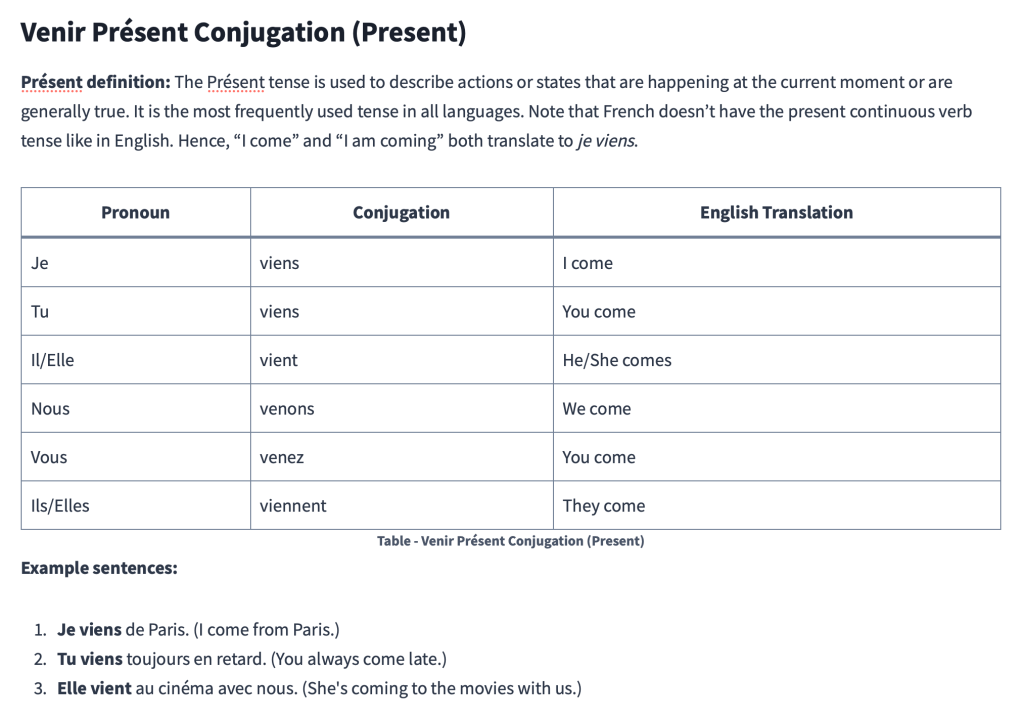
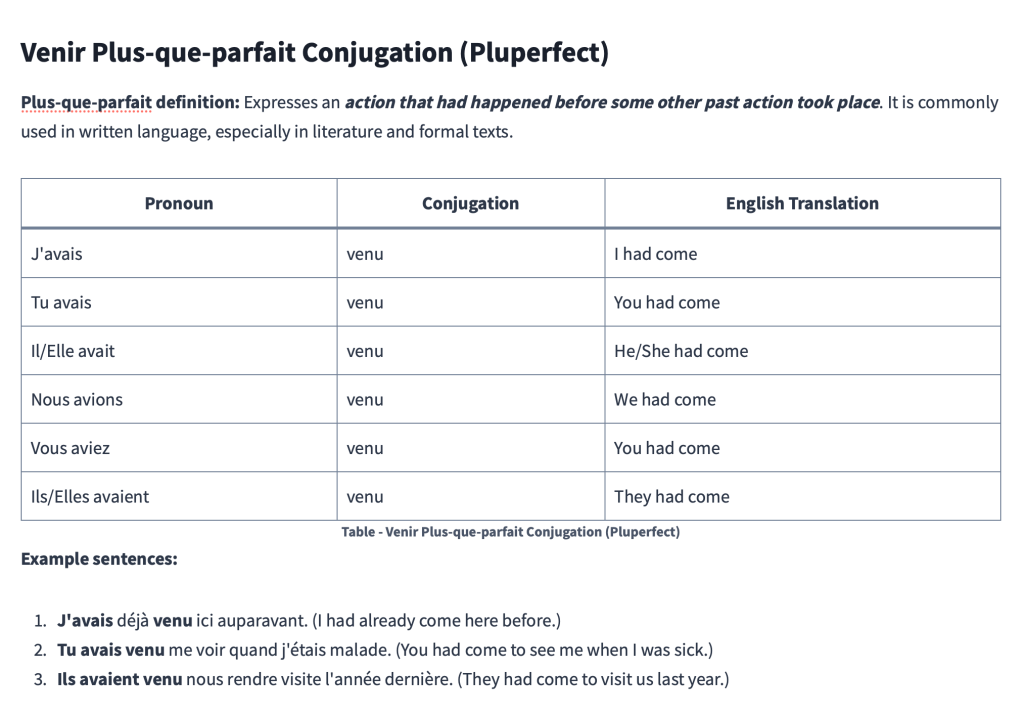
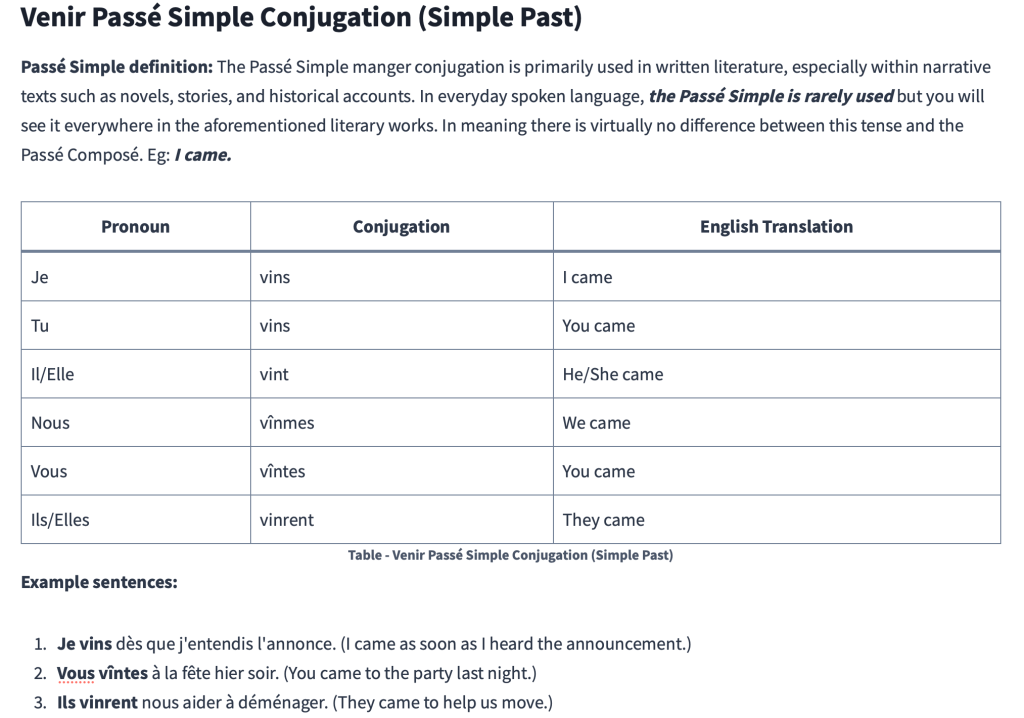
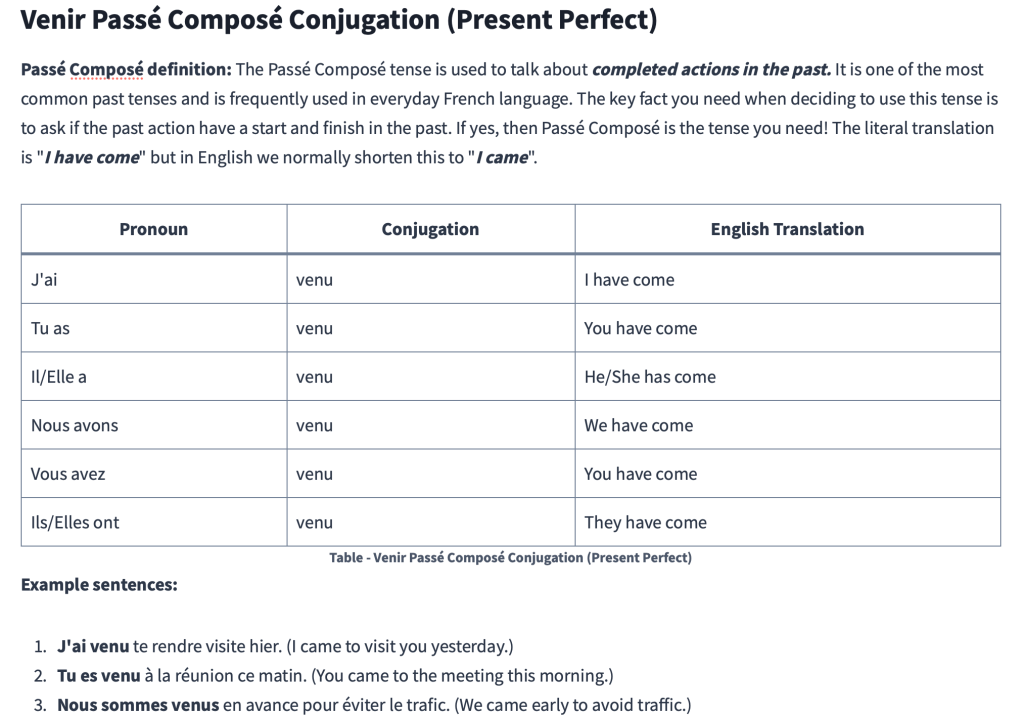
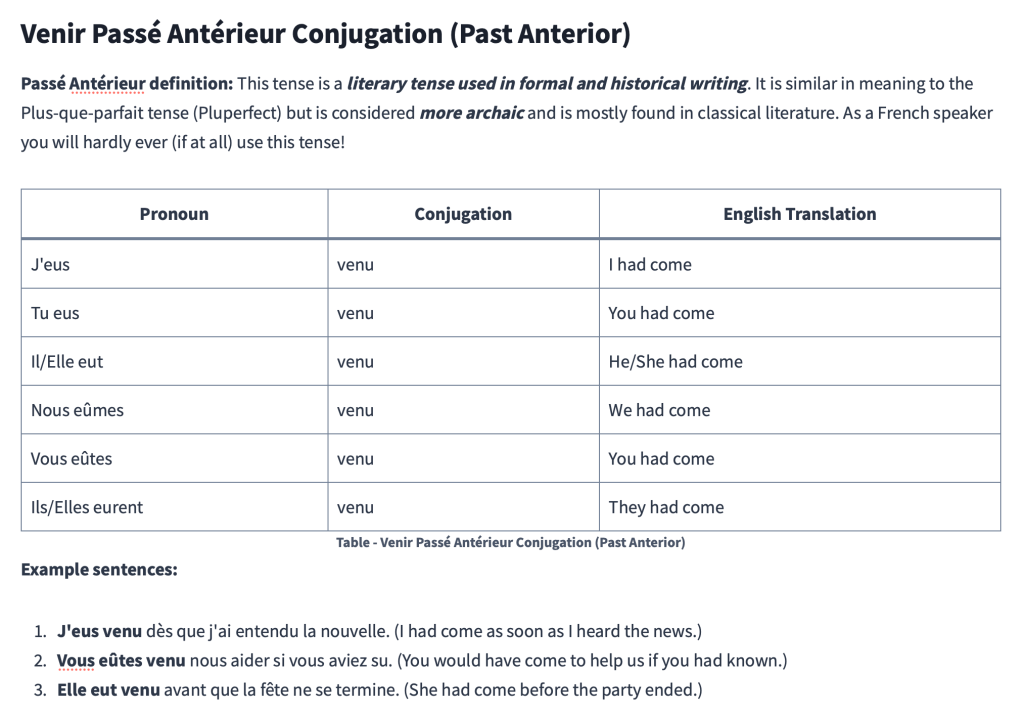
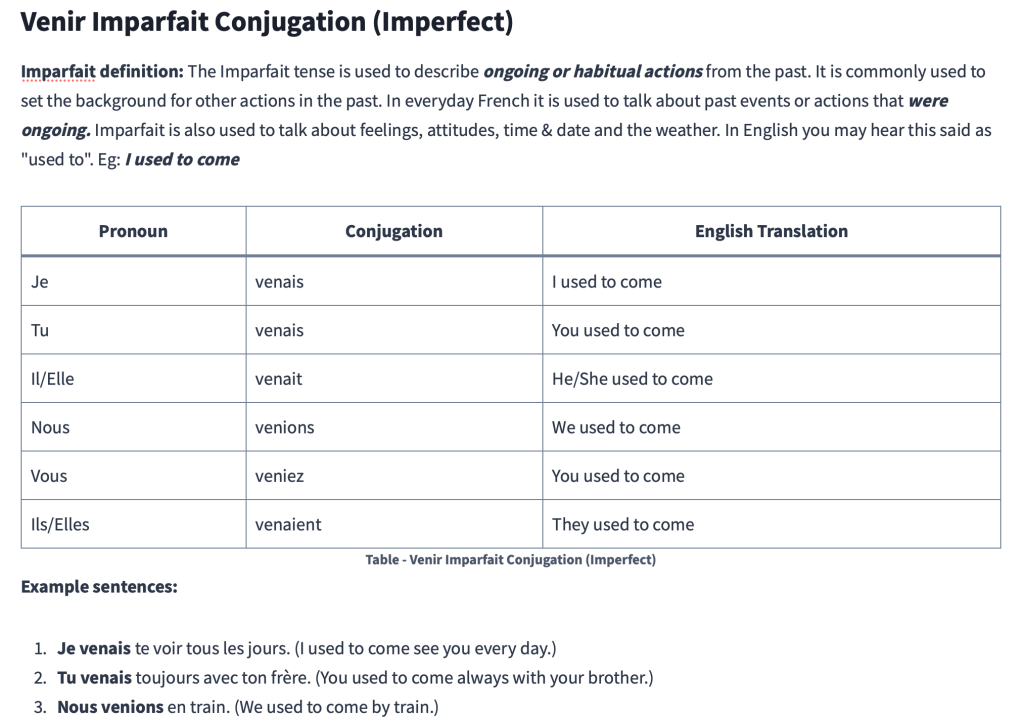
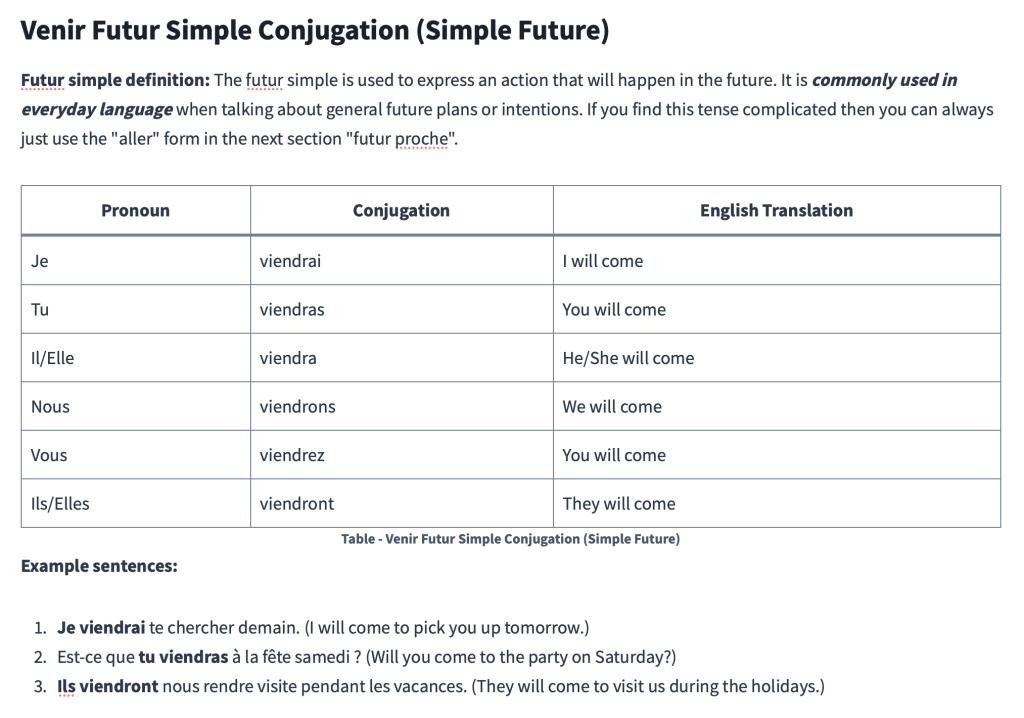
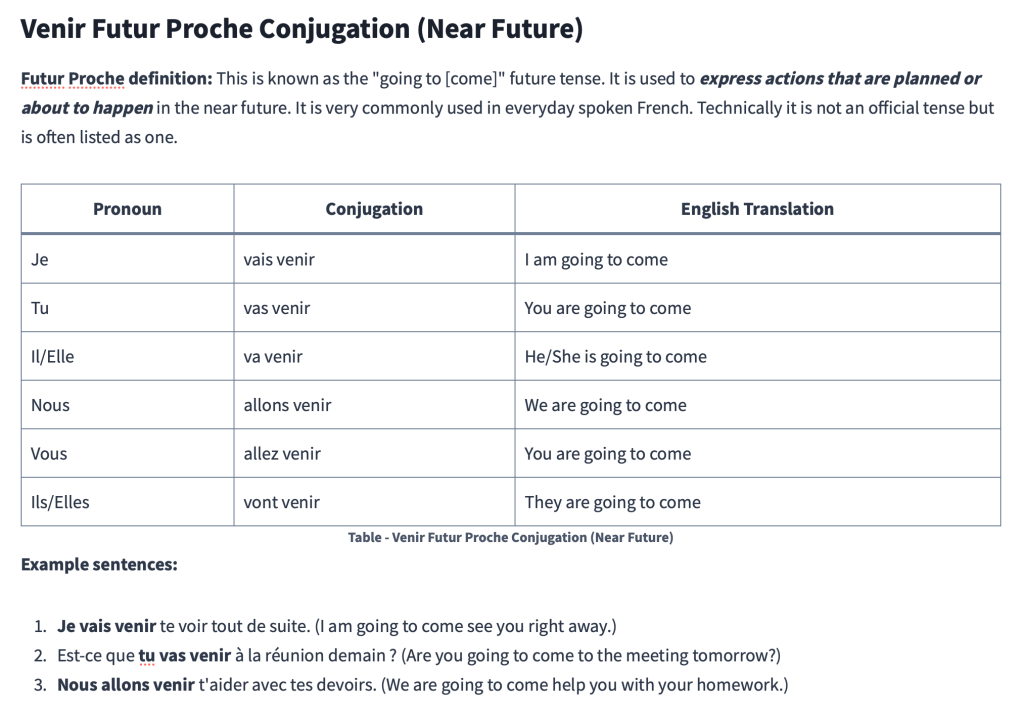
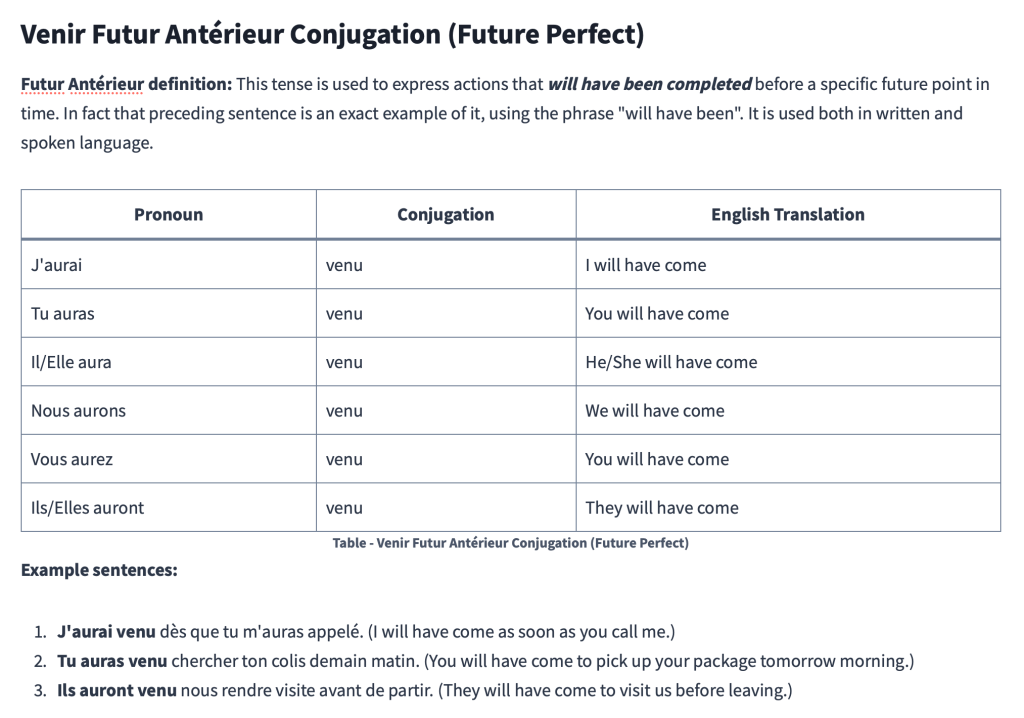
Other French Verb Conjugations You May be Interested In
We don’t only have prendre conjugations! Here are some others you may want to check out! Also, check out this link which tells you the history of the word.
